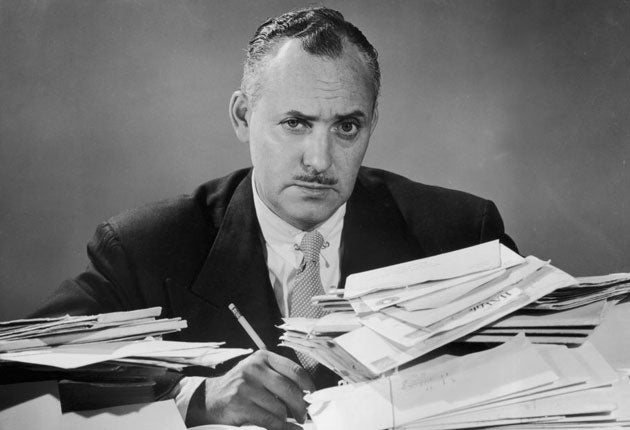Pity the poor taxman – his working life isn't full of happy returns

Your support helps us to tell the story
From reproductive rights to climate change to Big Tech, The Independent is on the ground when the story is developing. Whether it's investigating the financials of Elon Musk's pro-Trump PAC or producing our latest documentary, 'The A Word', which shines a light on the American women fighting for reproductive rights, we know how important it is to parse out the facts from the messaging.
At such a critical moment in US history, we need reporters on the ground. Your donation allows us to keep sending journalists to speak to both sides of the story.
The Independent is trusted by Americans across the entire political spectrum. And unlike many other quality news outlets, we choose not to lock Americans out of our reporting and analysis with paywalls. We believe quality journalism should be available to everyone, paid for by those who can afford it.
Your support makes all the difference.It seems an unlikely thing to say: but spare a thought for the taxman. Not only has the profession been despised since the time of Jesus, but Government research has now found that the practitioners are also the most miserable servants of the state.
Nine out of 10 of Britain's taxmen and women disagree with the statement that Her Majesty's Revenue and Customs is a good place to work – the lowest score of any government department.
Even more worryingly, more than 7,000 said that they had been bullied or harassed during the previous 12 months. One-quarter of the workforce wants to leave within a year.
Only 12 per cent said that they thought HMRC was well-managed, while 91 per cent of staff thought that recent changes in the department had not been for the better.
Details of the collapsing morale are contained in an analysis of more than 51,000 confidential staff questionnaires, which were filled in over the autumn, and come at the end of a turbulent time for HMRC.
Senior management came under widespread criticism in September when they admitted that nearly six million people had been charged the wrong amount of tax.
Nearly 1.5 million were told they owed an average of £1,428, amounting to about £2bn, while a further 4.3 million people were told they would get a rebate, because they have been charged too much.
At the same time, around 20,000 HMRC jobs have been cut as part of recent Government efficiency drives and 200 offices have been closed.
All this has clearly taken its toll on staff. Overall "engagement" (the term used to describe morale) was just 34 per cent – 23 per cent lower than average across the civil service, and 3 per cent less than last year.
Only 14 per cent of staff felt that HMRC inspired them to do the best in their jobs, while 12 per cent thought the department was managed well. Interestingly, most staff were positive about the work they did – if not the people they were working for: 72 per cent said they were interested in their work and half said it gave them a sense of personal accomplishment.
Unions said the results should be a wake up call for ministers – given the importance of the organisation in tackling the deficit.
The results of the civil service people survey, covering nearly 325,000 staff, were published earlier this month with a response rate of 62 per cent.
It was the second time such a survey had been carried out and revealed a much higher level of morale.
Join our commenting forum
Join thought-provoking conversations, follow other Independent readers and see their replies
Comments